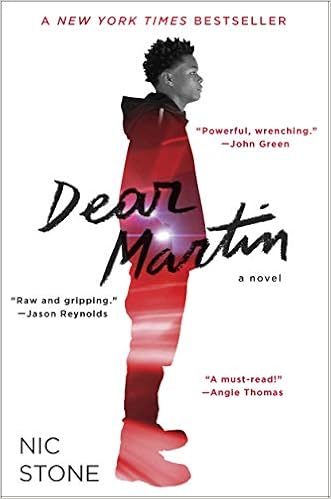Dear Martin is really fucking good. Justyce is writing letters to MLK Jr. as a way of processing what's happening around and to him... lots of racism and also normal teen stuff. Mixing letters, transcripts, and normal narration to tell a story of one Black teen's life.
He's a teenage boy (17) trying to figure out dating, worried about going to college, the stuff you're supposed to have to figure out. His friendships feels messy and genuine, his interactions with Manny and SJ have different vibes and it helps show what he likes about hanging out with them. The adults in his life (Doc, Justyn's mom, Manny's parents, SJ's parents) have very different kinds of advice to give and they help him to process what's happening in his life, even if he doesn't always agree with what they say about it.
It's also a book about racism, racial profiling, systemic racism, and police violence against Black people, because that's just as much a part of his life as his friendships and crushes.
The story is told through a mix of third-person narration focused on Justyce, his letters to Martin Luther King Jr., and various transcripts and letters not written by Justyce. The mix of narrative devices allows for "show not tell" when necessary, and to get Justyce's voice directly through the letters when he's had time to reflect on whatever just happened. It also means that a variety of levels of conversation on the same basic topics happen throughout the text.
It feels a bit like, narratively, Melo was in the story just to mess with Justyce (starting with the incident with Castillo, being repeatedly mentioned as on-again/off-again but not actually being in the story much). I wish she'd existed as more than someone to mess up his other relationships, there's a lot more of him explaining why he likes her than us actually seeing them together. But hey, sometimes it's like that, and ultimately this isn't a book about him and Melo.
Make time to read this one, I'll definitely be reading the sequel.
The book is inspired by real incidents but the specific details are fictional.
CWs for racism, police violence, murder, assault, gaslighting, major character death.

Comments
Post a Comment